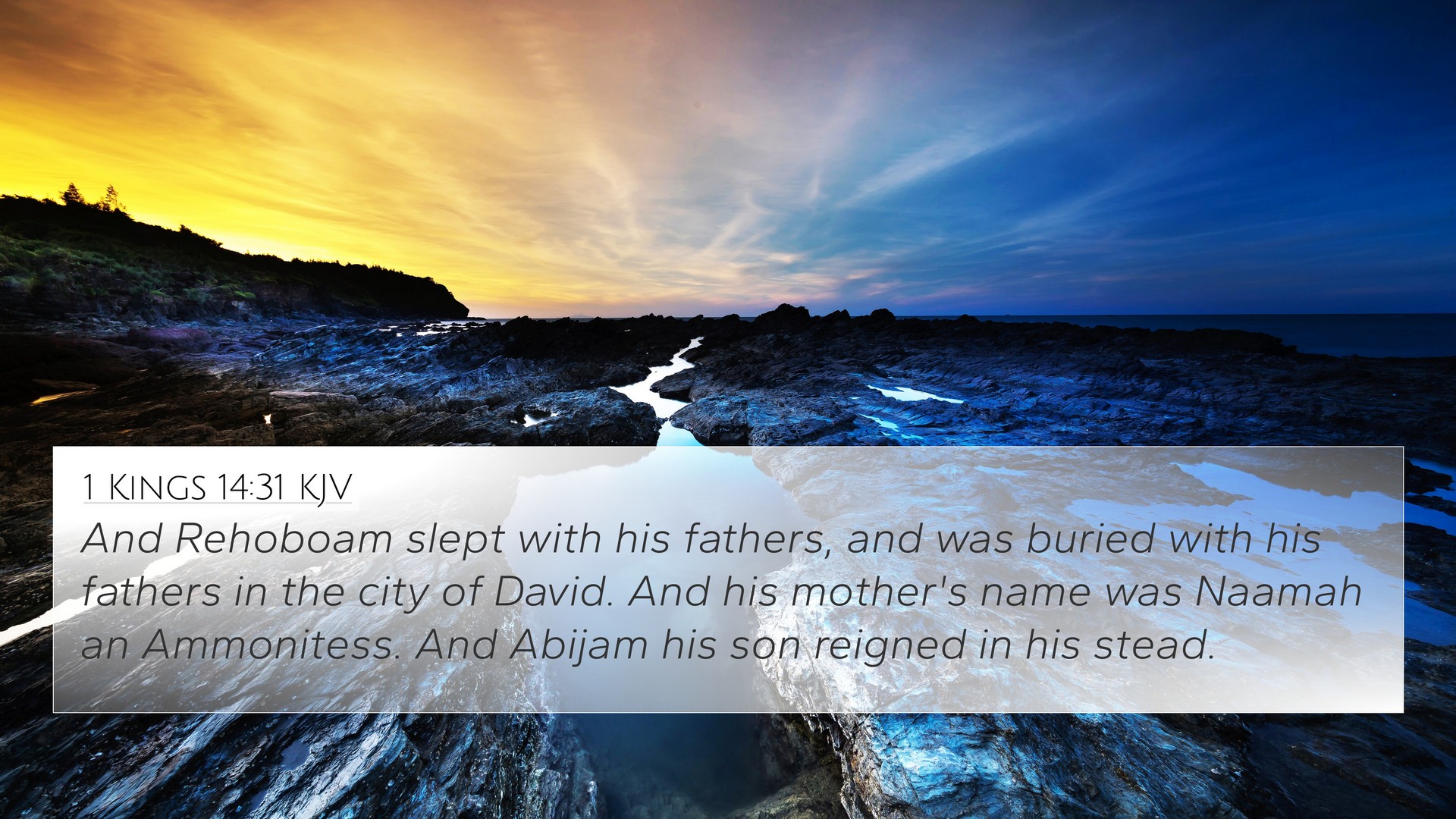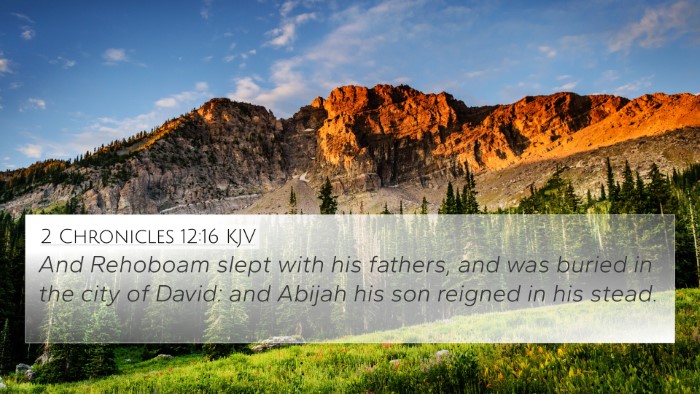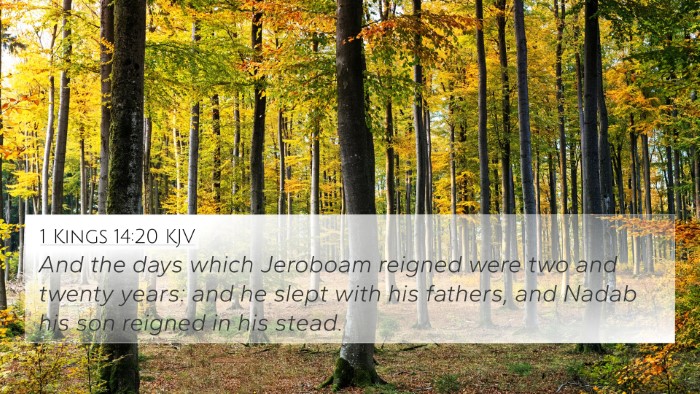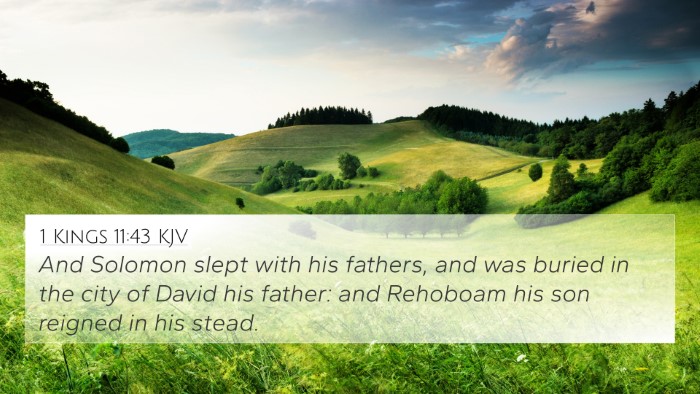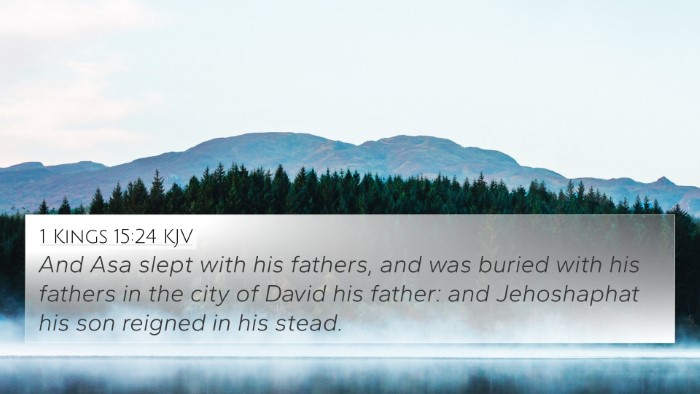Understanding 1 Kings 14:31
1 Kings 14:31 states, "And Rehoboam slept with his fathers, and was buried with his fathers in the city of David: and his mother's name was Naamah, an Ammonitess." This verse summarizes the end of King Rehoboam's reign, providing insight into his lineage and the significance of his reign in the context of Israel's monarchy.
Meaning and Interpretation
This passage highlights key themes in the history of Israel and God's relationship with His people as conveyed through the monarchy. Rehoboam's reign is marked by both political decisions and personal failures, and this verse transitions to the historical account of his death and burial.
Historical Context
According to Matthew Henry, Rehoboam's reign is significant as it represents the continuation of Davidic lineage amidst the political turmoil of the divided kingdom. His relationship with neighboring nations, like Ammon, reflected both his personal choices and the larger Israelite community's spiritual state.
Theological Insights
As noted by Albert Barnes, this verse serves as a reminder of the transient nature of earthly power. The mention of Rehoboam's mother, Naamah, underscores the influence of foreign relations on Israelite leadership and underscores how the surrounding nations affected worship practices and moral standards in Israel.
Personal Reflection
Adam Clarke emphasizes the personal aspect of Rehoboam’s life, suggesting that his legacy, compounded by his mother’s origins as an Ammonitess, serves as a cautionary tale regarding the dangers of assimilating foreign values and practices into the life of God’s chosen people.
Cross-Referencing Biblical Texts
This verse can be connected to various passages that highlight the themes of leadership, legacy, and the complexities within God's covenant people. Here are some relevant cross-references:
- 1 Kings 11:43 - Discusses the death of Solomon, setting the stage for Rehoboam’s ascension.
- 2 Chronicles 12:14 - Rehoboam’s heart was not fully devoted to the Lord, mirroring themes of divided loyalty in leadership.
- Jeremiah 22:30 - This passage prophesies the downfall of the lineage of kings from David due to unfaithfulness.
- 1 Kings 12:6-10 - Describes Rehoboam’s unwise counsel leading to the division of the kingdom.
- 1 Kings 11:1-2 - Discusses Solomon's marriages with foreign women, which sets a precedent for Rehoboam's heritage.
- 2 Kings 14:21-22 - Relates to the complexities of kingship in Israel’s history and the ongoing narrative about loyalty to God.
- Matthew 1:12 - Provides a genealogy link to the Davidic lineage that underscores the importance of familial heritage.
- Galatians 4:26 - Paul mentions the 'Jerusalem above' in contrast to earthly governance and the line of kings.
- Ezekiel 20:36-38 - God’s judgment on Israel as a nation serves as a backdrop to understand the fate of its leaders.
- Hebrews 7:14 - References Jesus as from the tribe of Judah, linked to David’s lineage and contrasting with the failed leadership in the Old Testament.
Cross-Referencing Tools and Methods
For those seeking tools for Bible cross-referencing, several resources can enhance the study and understanding of verses:
- Bible Concordance: This is an essential tool for locating specific verses and their occurrences throughout Scripture.
- Bible Cross-Reference Guide: Many study Bibles include cross-reference systems to track themes and connections across texts.
- Cross-Reference Bible Study: Engaging in this approach promotes a deeper understanding of the continuity and contrast in Biblical narratives.
- Cross-Referencing Bible Study Methods: Techniques like thematic study, where one traces a particular theme across various books, can offer profound insights.
- Bible Chain References: This method links verses to create a proverbial chain, leading to thematic explorations.
Conclusion
1 Kings 14:31 encapsulates a significant moment in Israel's history, inviting the reader to reflect on the implications of leadership, heritage, and divine faithfulness. Through cross-referencing biblical texts, believers can uncover layers of meaning that enrich their understanding of God’s plan throughout Scripture. For a more profound exploration, consider the comparative study of related verses to draw connections and see God’s faithfulness across generations.
